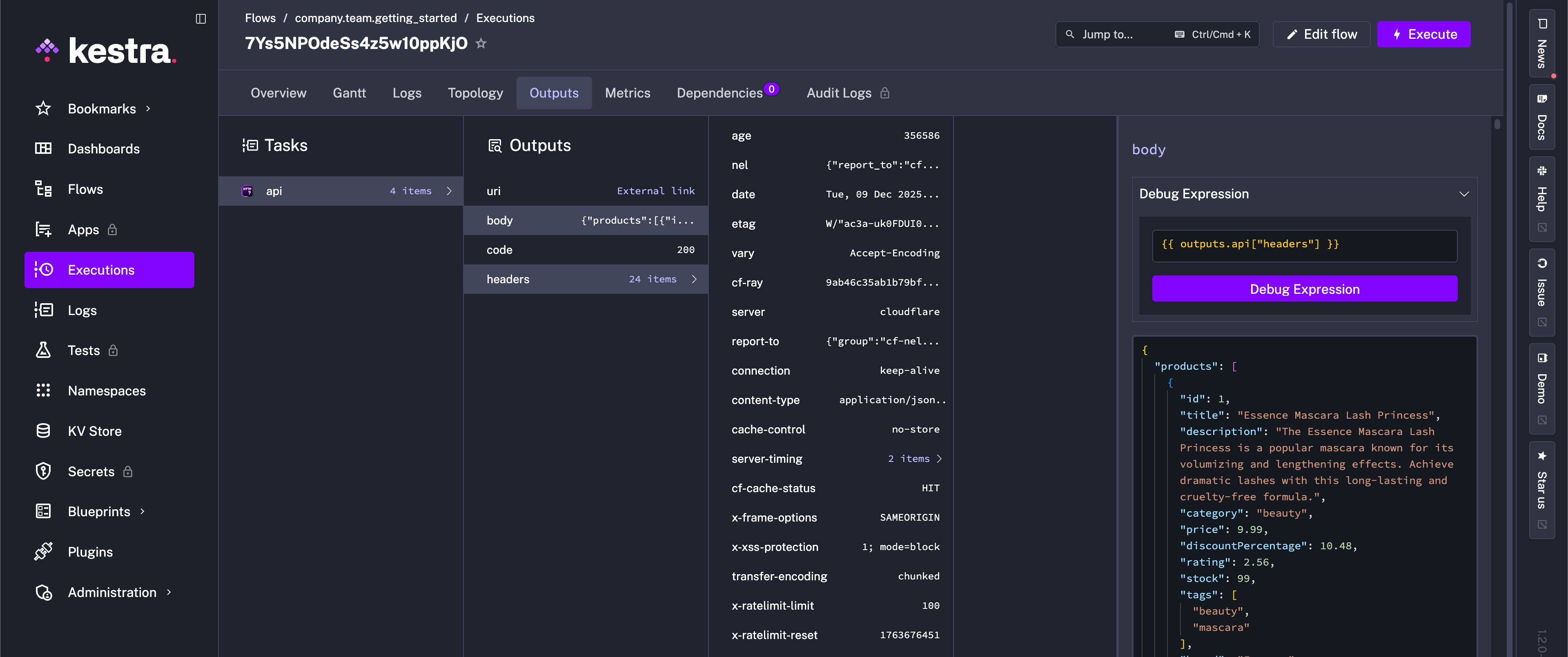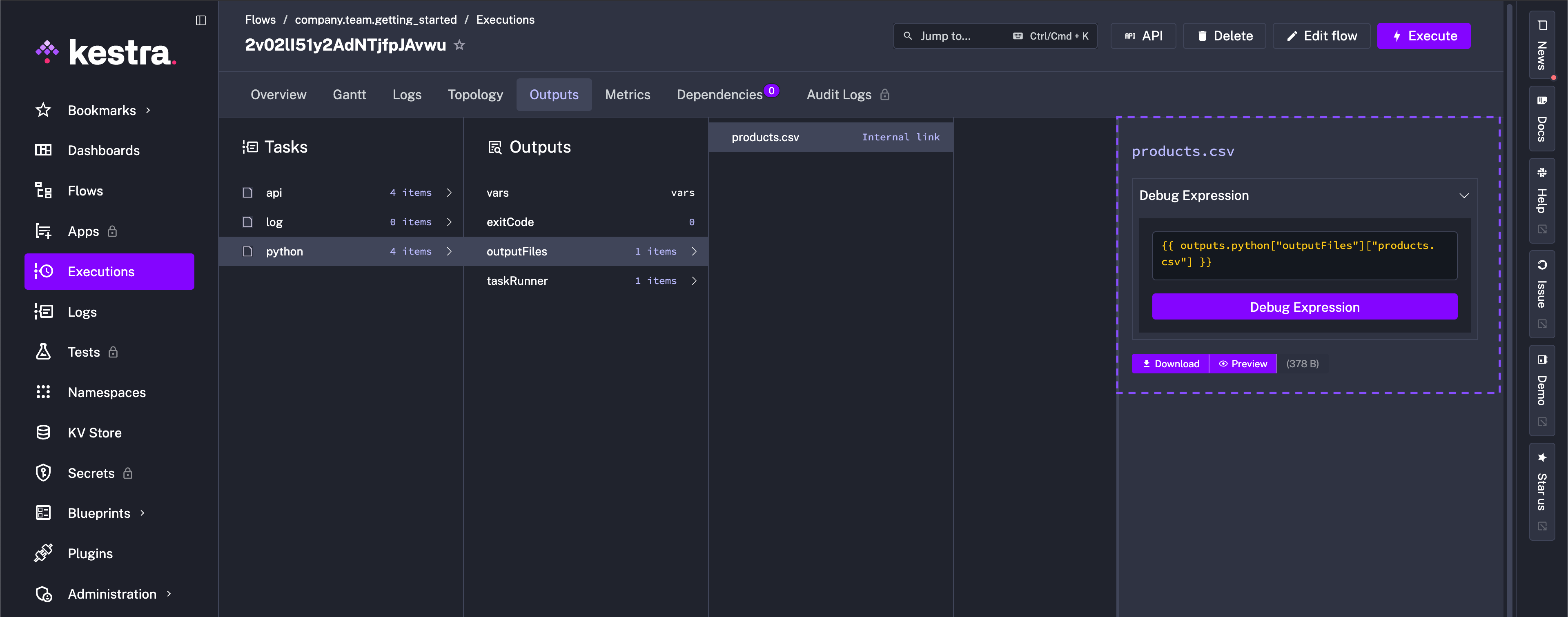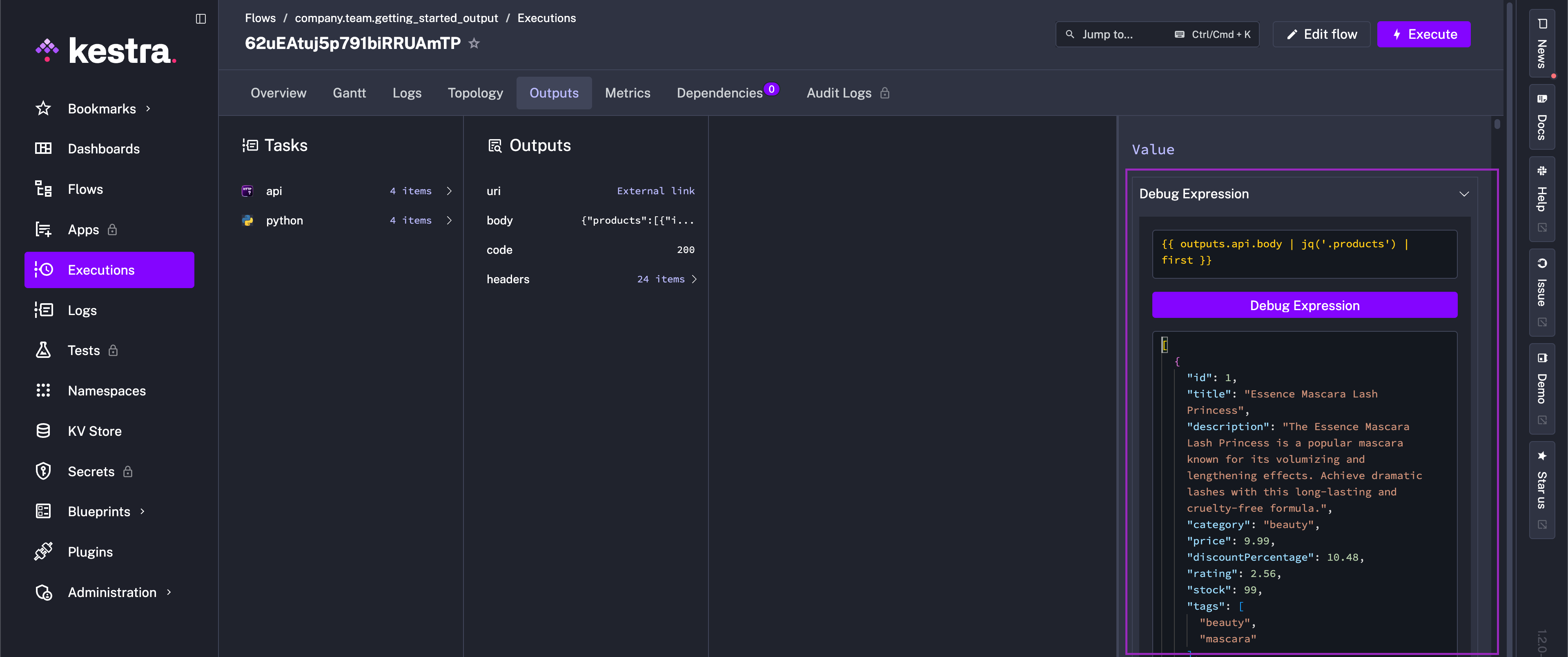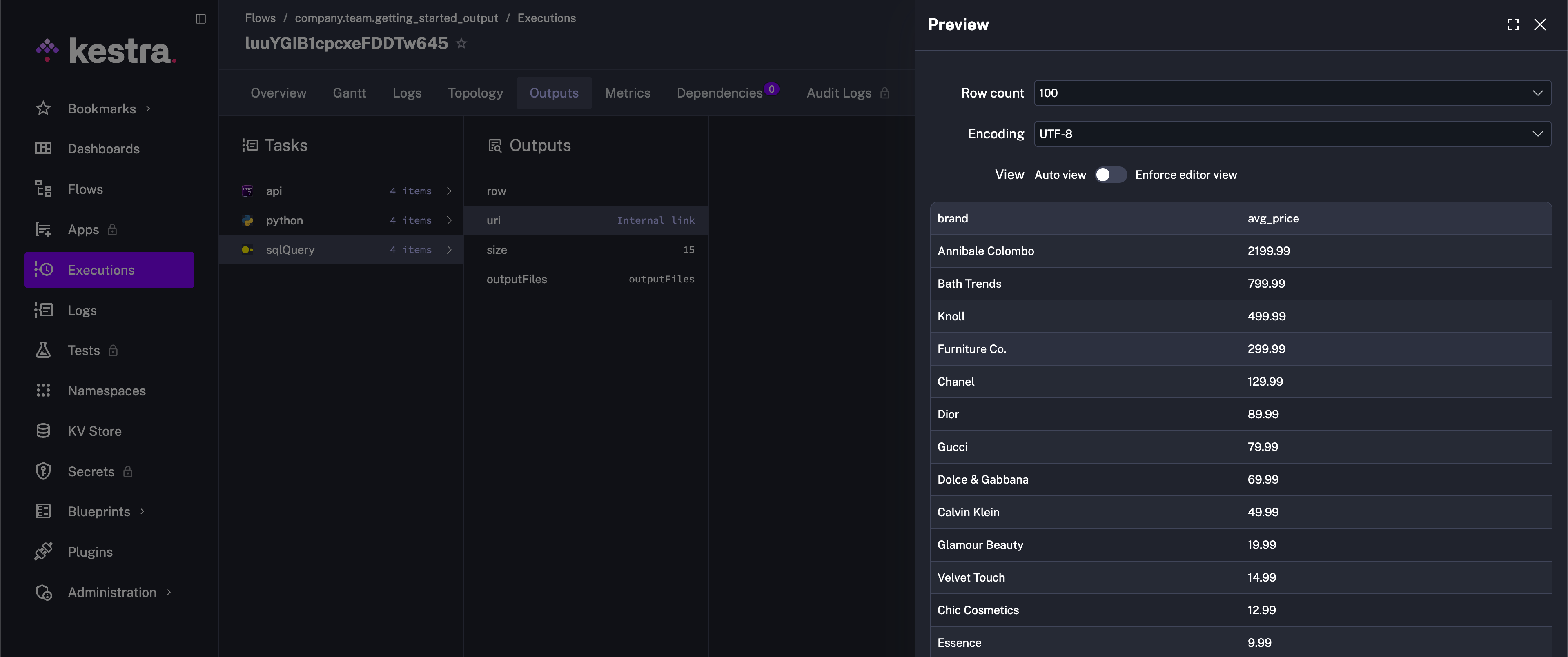 Tutorial – Pass Outputs Between Tasks in Kestra
Tutorial – Pass Outputs Between Tasks in Kestra
Outputs let you pass data between tasks and flows.
Pass Outputs between Tasks
Tasks and flows can generate outputs that are passed to downstream processes. To do this, Kestra uses internal storage. Tasks from the io.kestra.plugin.core.storage category, along with Outputs, interact with internal storage. You can think of internal storage like an S3 bucket, including your own private bucket.
This storage layer helps avoid connector sprawl. For example, the PostgreSQL plugin can extract data and load it into internal storage. Other tasks can then load that data into Snowflake, BigQuery, or Redshift — or process it with another plugin — without direct point-to-point connections. Let’s check out Outputs in practice.
How to retrieve outputs
To see which outputs have been generated during a flow execution, go to the Outputs tab on the Execution page:

Outputs are useful for troubleshooting and auditing. Additionally, you can use outputs to:
- share downloadable artifacts with business stakeholders (e.g., a table generated by a SQL query or a CSV file generated by a Python script)
- pass data between decoupled processes (e.g., pass subflow’s outputs or a file detected by S3 trigger to downstream tasks)
Similar to Inputs, use expressions to access Outputs in downstream tasks. Use the syntax {{ outputs.task_id.output_property }} to retrieve a specific output value of a task.
If your task id contains one or more hyphens (-), wrap the task id in square brackets, for example: {{ outputs['task-id'].output_property }}. Referring back to our flow, you’ll have seen that one of the outputs is the API status code (e.g., 200). We can access this output in a downstream task with an expression in a Log task, for example:
id: getting_startednamespace: company.team
inputs: - id: api_url type: STRING defaults: https://dummyjson.com/products
tasks: - id: api type: io.kestra.plugin.core.http.Request uri: "{{ inputs.api_url }}"
- id: log type: io.kestra.plugin.core.log.Log message: "API Status Code: {{ outputs.api.code }}"Use outputs in your flow
While returning status code is good for unit testing a flow, typically when fetching data from a REST API we want to use that data. Kestra stores that fetched data in the internal storage and makes it available to downstream tasks using the body output argument.
Use the {{ outputs.task_id.body }} syntax to process that fetched data in a downstream task. To demonstrate, we can add a Python script task to our flow below.
Kestra is language-agnostic — run custom scripts in any flow. You can run Python, Node.js, R, Julia, and an ever-growing number of languages; or execute commands in shell or PowerShell. Check out the Scripts documentation for more!
id: getting_started_outputnamespace: company.team
inputs: - id: api_url type: STRING defaults: https://dummyjson.com/products
tasks: - id: api type: io.kestra.plugin.core.http.Request uri: "{{ inputs.api_url }}"
- id: log type: io.kestra.plugin.core.log.Log message: "API Status Code: {{ outputs.api.code }}"
- id: python type: io.kestra.plugin.scripts.python.Script containerImage: python:slim beforeCommands: - pip install polars outputFiles: - "products.csv" script: | import polars as pl data = {{outputs.api.body | jq('.products') | first}} df = pl.from_dicts(data) df.glimpse() df.select(["brand", "price"]).write_csv("products.csv")This flow processes data using Polars and stores the result as a CSV file.

To avoid package dependency conflicts, the Python task runs in an independent Docker container. You can optionally provide a custom Docker image from a private container registry or use a public Python image from DockerHub and install any custom package dependencies using the beforeCommands argument. The beforeCommands argument allows you to install any custom package dependencies — here, we install Polars. Use as many commands as needed to prepare the containerized environment for script execution.
Debug expressions
When referencing the output from the previous task, this flow uses jq language to extract the products array from the API response — jq is available in all Kestra tasks without having to install it.
You can test {{ outputs.task_id.body | jq('.products') | first }} and any other output parsing expression using the built-in expressions evaluator on the Outputs page:

Passing data between tasks
So now our flow is able to handle different API endpoints through an input, extract that API’s data as an output, and pass that output to a custom Python script to package the data into a usable CSV file.
Let’s add another task to process the CSV file generated by the Python script task. We can pass the file from internal storage to the io.kestra.plugin.jdbc.duckdb.Query (DuckDB Plugin) task to run a SQL query on the CSV file and store the result as a downloadable artifact in internal storage.
id: getting_startednamespace: company.team
inputs: - id: api_url type: STRING defaults: https://dummyjson.com/products
tasks: - id: api type: io.kestra.plugin.core.http.Request uri: "{{ inputs.api_url }}"
- id: python type: io.kestra.plugin.scripts.python.Script containerImage: python:slim beforeCommands: - pip install polars outputFiles: - "products.csv" script: | import polars as pl data = {{ outputs.api.body | jq('.products') | first }} df = pl.from_dicts(data) df.glimpse() df.select(["brand", "price"]).write_csv("products.csv")
- id: sqlQuery type: io.kestra.plugin.jdbc.duckdb.Query inputFiles: in.csv: "{{ outputs.python.outputFiles['products.csv'] }}" sql: | SELECT brand, round(avg(price), 2) as avg_price FROM read_csv_auto('{{ workingDir }}/in.csv', header=True) GROUP BY brand ORDER BY avg_price DESC; store: trueThis example flow passes data between tasks using Outputs. The inputFiles argument of the io.kestra.plugin.jdbc.duckdb.Query task allows you to pass files from internal storage to the task. The store: true property ensures that the result of the SQL query is stored in the internal storage and can be previewed and downloaded from the Outputs tab.

To sum up, our flow extracts data from an API, uses that data in a Python script, executes a SQL query, and generates a downloadable artifact.
If you encounter any issues while executing the above flow, this might be a Docker-related issue (i.e., Docker-in-Docker setup, which can be difficult to configure on Windows). Set the runner property to PROCESS to run the Python script task in the same process as the flow rather than in a Docker container, as shown in the example below. This will avoid any Docker related issues.
id: getting_startednamespace: company.team
inputs: - id: api_url type: STRING defaults: https://dummyjson.com/products
tasks: - id: api type: io.kestra.plugin.core.http.Request uri: "{{ inputs.api_url }}"
- id: python type: io.kestra.plugin.scripts.python.Script taskRunner: type: io.kestra.plugin.core.runner.Process # Runs the Python script in the same process as the flow rather than a Docker container beforeCommands: - pip install polars outputFiles: - "products.csv" script: | import polars as pl data = {{ outputs.api.body | jq('.products') | first }} df = pl.from_dicts(data) df.glimpse() df.select(["brand", "price"]).write_csv("products.csv")
- id: sqlQuery type: io.kestra.plugin.jdbc.duckdb.Query inputFiles: in.csv: "{{ outputs.python.outputFiles['products.csv'] }}" sql: | SELECT brand, round(avg(price), 2) as avg_price FROM read_csv_auto('{{ workingDir }}/in.csv', header=True) GROUP BY brand ORDER BY avg_price DESC; store: trueOutputs can be used in many ways to connect tasks and flows. To learn more about Outputs, check out the full Outputs documentation. Next, instead of relying on a manual click, we’ll set up the flow to run automatically with a Trigger.
Was this page helpful?